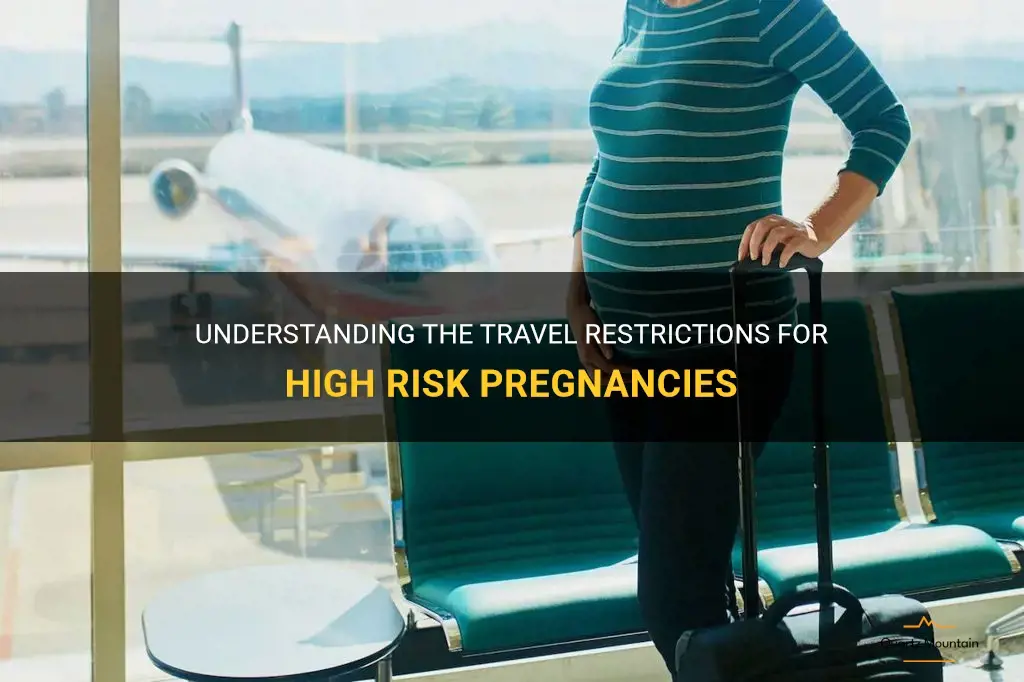
High-risk pregnancy is a term used to describe pregnancies that present a higher than average risk for complications. These complications can range from preterm labor to gestational diabetes, preeclampsia, or even potential harm to both the mother and the baby. Due to these heightened risks, travel restrictions may need to be put in place to ensure the health and safety of the mother and her unborn child. In this article, we will explore the reasons behind high-risk pregnancy travel restrictions and their importance in preventing potential complications.
| Characteristics | Values |
|---|---|
| Restriction Type | Travel restrictions for pregnant women |
| Gestational Age Limit | Varies by airline and destination |
| Medical Documentation Required | Usually a letter from a healthcare provider stating fitness to travel |
| Travel Insurance Coverage | May not cover complications related to pregnancy |
| Seat Assignment | Preferably closer to the aisle and with extra legroom if possible |
| Airport Security Screening | May require additional screening or exemption from certain procedures |
| Vaccination Requirements | Some vaccines may not be recommended during pregnancy |
| Travel Destination Considerations | Access to medical care, availability of prenatal care, infection risks |
| Travel Duration Considerations | Long flights may increase risk of blood clots |
| Activities Restrictions | Limitations on certain activities such as scuba diving or high-altitude trekking |
What You'll Learn
- What are the most common travel restrictions for women with high-risk pregnancies?
- How do the restrictions vary depending on the specific high-risk condition?
- Are there any exceptions or special considerations for pregnant women who need to travel for medical reasons?
- How do travel restrictions for high-risk pregnancies differ between domestic and international travel?
- What precautions should pregnant women take when traveling, regardless of their pregnancy risk level?

What are the most common travel restrictions for women with high-risk pregnancies?

Traveling can be an exciting and memorable experience, but when it comes to women with high-risk pregnancies, certain travel restrictions can apply due to the potential risks involved. Here are some of the most common travel restrictions for women with high-risk pregnancies.
First and foremost, it is important for women with high-risk pregnancies to consult with their healthcare provider before making any travel plans. The healthcare provider will be able to assess the individual situation and provide the best advice regarding travel restrictions.
One of the most common travel restrictions for women with high-risk pregnancies is a restriction on flying. Air travel, especially long-haul flights, can be physically demanding and pose certain risks for pregnant women. The decrease in cabin pressure, as well as the limited mobility, can increase the risk of blood clots. Additionally, the stress of flying and the potential exposure to different bacteria and viruses can also be a concern for pregnant women.
Another travel restriction for women with high-risk pregnancies is a limitation on traveling to certain destinations. Certain countries or regions may have limited access to healthcare facilities or may have higher incidences of infectious diseases. These factors can increase the risks for pregnant women, especially if complications were to occur.
Women with high-risk pregnancies may also be advised to avoid activities that involve excessive physical exertion or high altitudes. Activities such as hiking at high altitudes, scuba diving, or other strenuous activities can increase the risks of complications for pregnant women. It is important to listen to the advice of healthcare providers and avoid activities that could potentially harm the mother or the baby.
Additionally, women with high-risk pregnancies may be advised to avoid traveling during certain stages of their pregnancy. The first trimester and the last few weeks of pregnancy are generally considered to be the highest risk periods. During the first trimester, the risk of miscarriage is higher, and during the last few weeks of pregnancy, there is an increased risk of preterm labor. Traveling during these periods can increase the risks and should be avoided if possible.
In conclusion, women with high-risk pregnancies may face certain travel restrictions to ensure their health and the health of their baby. Restrictions may include limitations on flying, limitations on traveling to certain destinations, avoiding strenuous activities, and avoiding travel during certain stages of pregnancy. As always, it is crucial for women with high-risk pregnancies to consult with their healthcare provider for personalized advice and guidance before making any travel plans.
EVA Air Travel Restrictions: What Passengers Need to Know Before Flying
You may want to see also

How do the restrictions vary depending on the specific high-risk condition?

When it comes to high-risk conditions and the restrictions that individuals may face, it is important to recognize that not all conditions carry the same level of risk. Different conditions can vary in severity and the impact they have on an individual's daily life, which can in turn affect the restrictions they may face.
One example of a high-risk condition is asthma. Asthma is a chronic respiratory condition that can cause inflammation and narrowing of the airways, leading to difficulty breathing. People with asthma may experience symptoms such as wheezing, coughing, and shortness of breath.
In terms of restrictions, individuals with asthma may need to take certain precautions to minimize their risk of exacerbation or triggers. This can include avoiding exposure to allergens or irritants that may trigger an asthma attack, such as cigarette smoke, pollen, or pet dander. They may also need to carry a rescue inhaler with them at all times in case of an emergency.
People with asthma may also need to be mindful of certain activities that can potentially worsen their symptoms or put them at higher risk. For example, participating in intense physical activity without proper warm-up and preparation can potentially trigger an asthma attack. Therefore, individuals with asthma may need to modify or avoid certain physical activities that could potentially pose a risk to their respiratory health.
Another high-risk condition is diabetes. Diabetes is a condition characterized by high blood sugar levels, either due to the body's inability to produce insulin (Type 1 diabetes) or the body's ineffective use of insulin (Type 2 diabetes). People with diabetes may need to carefully manage their blood sugar levels through diet, exercise, medication, and regular monitoring.
In terms of restrictions, individuals with diabetes may need to closely monitor their dietary intake and regulate their carbohydrate consumption. They may need to avoid or limit foods that can cause significant spikes in blood sugar levels, such as sugary beverages, processed snacks, and high-carbohydrate meals. They may also need to adopt a regular exercise routine to help manage their blood sugar levels and maintain overall health.
Furthermore, individuals with diabetes may need to take precautions to prevent complications related to their condition. For example, they may need to regularly check their feet for signs of infection or injury, as diabetes can impair the body's ability to heal and increase the risk of foot ulcers or infections. They may also need to be vigilant in managing their overall health, as diabetes can increase the risk of other health issues, such as heart disease or kidney disease.
It is important to note that the specific restrictions individuals may face can vary depending on the severity and management of their high-risk condition. Some individuals may be able to effectively manage their condition with medication and lifestyle modifications, allowing them to lead relatively unrestricted lives. On the other hand, individuals with more severe or uncontrolled conditions may face greater restrictions in terms of their daily activities and overall lifestyle choices.
In summary, the restrictions that individuals with high-risk conditions may face can vary depending on the specific condition they have and its impact on their daily life. Conditions such as asthma and diabetes may require individuals to take certain precautions, modify their activities, and adopt specific management strategies to minimize their risk and maintain their health. It is important for individuals with high-risk conditions to work closely with their healthcare team to develop a personalized management plan that fits their specific needs and helps them lead a healthy and fulfilling life.
Alaska Travel Restrictions: What You Need to Know if You're Vaccinated
You may want to see also

Are there any exceptions or special considerations for pregnant women who need to travel for medical reasons?

Pregnancy is a time when most women prefer to stay close to home and minimize their travel. However, there are certain situations where pregnant women may need to travel for medical reasons. In such cases, there may be exceptions or special considerations that need to be made to ensure the safety and well-being of both the mother and the baby.
The first thing that pregnant women should do before making any travel plans is to consult with their healthcare provider. The healthcare provider will be able to assess the specific medical condition of the pregnant woman and determine if it is safe for her to travel. They will take into consideration factors such as the gestational age, any pregnancy complications, and the mode of transportation.
If a pregnant woman is cleared by her healthcare provider to travel, there are still certain precautions she needs to take. It is important to plan the trip in advance and inform the airline, bus, or train company about the pregnancy. They may have their own policies and guidelines for pregnant travelers, such as requiring a doctor's clearance or restricting travel after a certain gestational age.
When traveling, pregnant women should make sure to stay hydrated and take frequent breaks to stretch and walk around. It is also important to wear comfortable clothing and shoes to promote good circulation. Compression stockings can also be worn to prevent swelling and blood clots.
In terms of destination, pregnant women should avoid traveling to areas that have a high risk of infectious diseases, such as Zika virus or malaria. They should also avoid traveling to destinations with inadequate medical facilities in case of a medical emergency. It is always a good idea to check the travel advisories and consult with healthcare providers regarding any specific risks associated with the destination.
If the pregnant woman needs to travel for a medical procedure or treatment, she should ensure that the healthcare facility at the destination is equipped to handle her specific needs. It may be necessary to coordinate with the healthcare providers at both ends to ensure a smooth transition of care.
During the journey, pregnant women should also have access to medical records, medications, and emergency contact information. It is advisable to carry a copy of the prenatal records and any relevant medical documents in case of any unexpected medical issues.
In conclusion, there may be exceptions or special considerations for pregnant women who need to travel for medical reasons. It is important to consult with a healthcare provider, plan the trip in advance, and take necessary precautions to ensure a safe and comfortable journey. By taking these steps and being well-prepared, pregnant women can minimize the risks and make necessary travel arrangements for their medical needs.
Exploring the Ever-changing Spain Travel Restrictions: What You Need to Know Today
You may want to see also

How do travel restrictions for high-risk pregnancies differ between domestic and international travel?

Travel restrictions for high-risk pregnancies can differ between domestic and international travel. While both can pose potential risks for pregnant women, there are various factors that come into play when determining travel restrictions for each scenario.
Domestic travel restrictions for high-risk pregnancies typically depend on the severity of the pregnancy condition and the distance to be traveled. If the pregnancy is considered high-risk, healthcare providers may advise against long-distance travel, especially if the destination does not have adequate medical facilities to handle potential complications. In such cases, it is recommended to stay within closer proximity to the healthcare provider to ensure prompt medical attention if needed.
However, for less severe high-risk pregnancies, domestic travel may still be possible but with certain precautions. Pregnant women are advised to consult with their healthcare providers before making any travel plans. They may be advised to take regular breaks during travel to stretch their legs, wear compression stockings to prevent blood clots, and stay hydrated. Additionally, it is recommended to carry a copy of medical records, in case of emergencies, and familiarize oneself with the nearest healthcare facilities at the travel destination.
On the other hand, international travel for high-risk pregnancies can be more challenging due to additional factors. The availability and quality of healthcare facilities may vary significantly between countries, making it essential to thoroughly research the medical services available at the travel destination. This research should include identifying hospitals with specialized maternity units or facilities experienced in dealing with high-risk pregnancies.
Moreover, pregnant women should consider the stability of the destination country's healthcare system and access to emergency medical evacuation services. In the event of complications, having access to appropriate medical care may be critical, and arranging emergency evacuation can be complex in some regions.
Furthermore, pregnant individuals may encounter additional challenges when traveling internationally, such as language barriers and unfamiliarity with local customs and practices. This can make communication with healthcare providers and navigating the local healthcare system more difficult. It is recommended to carry necessary medical records translated into the local language and consult with a travel healthcare provider for guidance.
In both domestic and international travel scenarios, it is vital for pregnant women to prioritize their health and the health of their unborn child. When in doubt, seeking advice from healthcare professionals is necessary to ensure a safe and smooth travel experience.
Can States Restrict Travel for Abortion? Exploring the Legal and Ethical Implications
You may want to see also

What precautions should pregnant women take when traveling, regardless of their pregnancy risk level?

When it comes to traveling during pregnancy, it's important for women to take certain precautions to ensure their own safety as well as the safety of their unborn child. Whether you have a high-risk pregnancy or not, these guidelines can help make your journey a smooth and worry-free experience.
- Consult with your healthcare provider: Before planning any trip, it's important to speak with your doctor or midwife. They can assess your overall health and provide specific advice based on your pregnancy and any potential risks.
- Choose your destination wisely: Consider the location and the length of the trip. Opt for destinations that are easily accessible and have good healthcare facilities nearby. Avoid destinations that require vaccinations or where the risk of contagious diseases is high.
- Time your travel wisely: The best time to travel during pregnancy is usually during the second trimester (between the 18th and 24th week). At this stage, most of the pregnancy discomforts have subsided, and you are generally not too far along to have concerns with preterm labor.
- Pack appropriate clothing and essentials: Make sure to pack comfortable clothing that allows for easy movement and promotes proper circulation. Don't forget to include items such as prenatal vitamins, a copy of your medical records, insurance information, and any necessary medications.
- Stay hydrated: Pregnancy increases the body's need for fluids, so make sure to drink plenty of water throughout your journey. Dehydration can lead to various complications, including preterm contractions and dizziness.
- Move and stretch regularly: Long periods of sitting or standing can cause leg swelling and discomfort. Take breaks every hour or so to stretch your legs, walk around, and improve circulation. Consider wearing compression stockings for added support.
- Avoid prolonged exposure to heat: High temperatures can make you feel dizzy, exhausted, and dehydrated. Try to stay in air-conditioned areas as much as possible and wear loose, breathable clothing. If you're traveling to a sunny destination, don't forget to apply sunscreen and wear a hat and sunglasses.
- Maintain a healthy diet: Despite being away from home, it's important to continue eating a balanced diet. Avoid consuming undercooked or raw foods that may pose a risk of foodborne illnesses. Pack healthy snacks to keep your energy levels up throughout the journey.
- Practice good hygiene: Wash your hands frequently, especially before meals, to prevent the spread of germs. Carry hand sanitizer for situations where soap and water are not readily available.
- Listen to your body: Pay attention to any warning signs such as vaginal bleeding, abdominal pain, severe headache, or decreased fetal movement. If you experience any unusual symptoms, seek medical attention immediately.
Remember, every pregnancy is unique, and it's essential to discuss your travel plans with your healthcare provider. They can provide personalized advice based on your specific circumstances and help ensure a safe and enjoyable trip for both you and your baby.
Understanding the Travel Restrictions Imposed by flydubai: Everything You Need to Know
You may want to see also
Frequently asked questions
It is generally recommended to avoid air travel during a high-risk pregnancy. The changes in cabin pressure and limited mobility during the flight can potentially put added stress on both the mother and the baby. It is best to consult with your healthcare provider before making any travel plans and follow their guidance.
Long-distance travel, such as road trips or train journeys, may also pose risks for women with high-risk pregnancies. The extended periods of sitting or being in one position can increase the chances of blood clots forming, which can be dangerous. It is important to discuss your travel plans with your healthcare provider to ensure the safety of both you and your baby.
There is no one-size-fits-all answer to this question, as each high-risk pregnancy is unique. Your healthcare provider will assess your specific condition and determine if and when travel may be safe. In some cases, travel may be restricted throughout the entire pregnancy, while in others, it may be deemed safe during certain stages. Always consult with your healthcare provider before making any travel plans.
If travel is deemed unsafe during a high-risk pregnancy, there are alternative options to consider. Virtual alternatives, such as video calls and virtual conferences, can be utilized for business or personal meetings that would normally require travel. Additionally, if there is a need to travel for medical reasons, arrangements can be made for medical transport, where specialized providers can ensure your safety and comfort during the journey. Again, it is crucial to discuss these options with your healthcare provider to determine the safest course of action for you and your baby.







